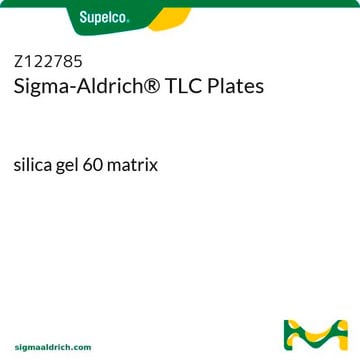Z148717
Sigma-Aldrich® TLC Plates
chiral-silica gel matrix, L × W 20 cm × 20 cm, binder, Polymeric, fluorescent indicator: no
Sign Into View Organizational & Contract Pricing
All Photos(1)
About This Item
UNSPSC Code:
41115711
eCl@ss:
32110504
Recommended Products
material
chiral-silica gel matrix
glass support
feature
binder Polymeric
fluorescent indicator: no
manufacturer/tradename
Sigma-Aldrich
technique(s)
thin layer chromatography (TLC): suitable
L × W
20 cm × 20 cm
layer thickness
250 μm
particle size
10 μm
Looking for similar products? Visit Product Comparison Guide
General description
Thin-layer chromatography (TLC) plates for adsorption, partition, and ion-exchange techniques. Six media choices with glass, polyester, and aluminum backings. Silica-based adsorbent layers in Sigma-Aldrich TLC plates incorporate a polymeric binder; highly purified silica gel plates incorporate a gypsum/polymer binder.
- Silica gel - for weakly to strongly polar separations, pore size 60 Å
- High purity silica gel - acid washed for separation of aflatoxins
- Cellulose - for partition chromatography, (SigmaCell Type 100 Cellulose)
- Cellulose PEI - for separation of weak anions (amino acids, peptides) PEI plates may turn slightly yellow, affecting separation. Pre-develop plates in distilled water to minimize yellow color.
- Chiral silica - for separation of optically active isomers by ligand exchange, pore size 60Å
Application
Sigma-Aldrich TLC Plates was used for TLC analysis during GTPase activity assay and lipid extraction/analysis.
Legal Information
SIGMA-ALDRICH is a registered trademark of Merck KGaA, Darmstadt, Germany
Certificates of Analysis (COA)
Search for Certificates of Analysis (COA) by entering the products Lot/Batch Number. Lot and Batch Numbers can be found on a product’s label following the words ‘Lot’ or ‘Batch’.
Already Own This Product?
Find documentation for the products that you have recently purchased in the Document Library.
Heiko Runz et al.
The Journal of neuroscience : the official journal of the Society for Neuroscience, 22(5), 1679-1689 (2002-03-07)
Generation of amyloid-beta (Abeta) from the amyloid precursor protein (APP) requires proteolytic cleavage by two proteases, beta- and gamma-secretase. Several lines of evidence suggest a role for cholesterol on secretase activities, although the responsible cellular mechanisms remain unclear. Here we
Chuang-Rung Chang et al.
The Journal of biological chemistry, 282(30), 21583-21587 (2007-06-08)
Mitochondria in cells comprise a tubulovesicular reticulum shaped by dynamic fission and fusion events. The multimeric dynamin-like GTPase Drp1 is a critical protein mediating mitochondrial division. It harbors multiple motifs including GTP-binding, middle, and GTPase effector (GED) domains that are
Our team of scientists has experience in all areas of research including Life Science, Material Science, Chemical Synthesis, Chromatography, Analytical and many others.
Contact Technical Service








